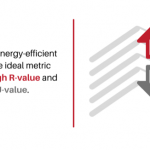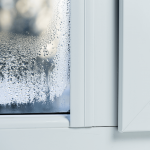Beautiful windows can easily transform your space into a gorgeous escape while highlighting your design choices. Although most new windows will look great, not all windows will be as durable or be as energy efficient. If you are thinking about updating your home with new windows, it is extremely important that you understand how to tell whether you are getting a great new window or if you are being sold a subpar product. Here at LEI Home Enhancements, we pride ourselves in providing some of the best windows on the market all at a great price. Contact us to get your new windows installed today. Here are a few ways to tell whether your new windows will stand the test of time.
U-Factor
Energy efficiency is one of the most important factors to consider whenever you are looking to upgrade your windows. Over the course of their lifespan, energy-efficient windows will save you thousands of dollars on your energy bills, whereas subpar products be a costly mistake. U-factor is one of the most important numbers to keep in mind whenever you are looking at energy-efficient windows. U-factor is the rate at which a window conducts all non-solar heat flow. In general, the lower the U-factor, the more energy-efficient your windows will be. U-factors can range between .25 to 1.25 and will be measured in Btu/h·ft²·°F. Energy-efficient windows will generally have a U-factor below .30, though the requirements for energy-efficient ratings vary depending on where you live.
Solar Heat Gain Coefficient
Sunlight is one of the most powerful forces in your home, and intense sunlight can easily cause the temperature to skyrocket. Although your windows will always allow a certain amount of solar energy to get into your home, some windows will be able to block out sunlight more efficiently. The amount of solar energy allowed through a window is calculated through the solar heat gain coefficient and will be measured between zero and one, with one allowing 100% of the energy through and 0 allowing no energy through. For colder climates, a higher solar heat gain coefficient can be beneficial as it can actively heat your home. The same is true in hotter climates, where a lower solar heat gain coefficient can help you save some serious money on keeping your home cool and comfortable.
Visible Transmittance
Although it has nothing to do with energy efficiency, visible transmittance is an extremely important factor for any window. Visible transmittance measures the amount of visible light that will be allowed into your home. Much like the other factors discussed here, visible transmittance is measured between zero and one and can be affected by the type of glass used, the frame, sash, and grids. If you want to add some extra light to your space, make sure that you choose a window with high visible transmittance.
If you are looking to update your home with beautifully efficient windows, contact LEI Home Enhancements today. Our team will make sure that you get the perfect windows to fit your space, style, and budget.
Sharing is caring!






